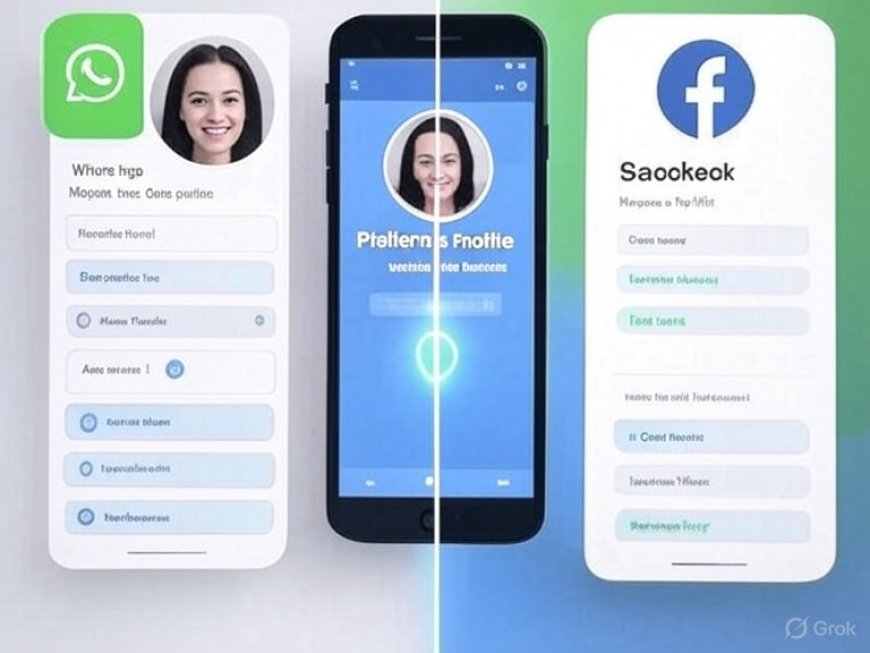WhatsApp to Introduce Facebook Profile Picture Import Feature: What Users Need to Know
WhatsApp is testing a new feature to import Facebook profile pictures directly into WhatsApp profiles. Here’s everything you need to know about the integration, privacy settings, and rollout timeline.

In a significant move that further integrates the Meta ecosystem, WhatsApp is reportedly testing a feature that allows users to import their Facebook profile picture directly into WhatsApp. This upcoming capability, currently spotted in beta versions, is aimed at offering users more control and convenience when managing their identity across Meta-owned platforms.
The feature is still under development but has already started making headlines among tech communities and digital privacy enthusiasts.
What Is the New WhatsApp-Facebook Profile Sync Feature?
As per reliable reports from beta testing communities, the new feature appears in WhatsApp for Android beta version 2.25.21.23, allowing users to select their Facebook profile photo directly while editing their WhatsApp display picture. This removes the need to download the image separately and upload it again on WhatsApp, which was the previous cumbersome method.
This sync option is expected to be made available through the Meta Accounts Center, a central hub where users can link their Facebook, Instagram, and WhatsApp accounts for cross-platform functionality.
Why This Integration Matters
This development is a part of Meta’s broader strategy to unify its social platforms under a shared ecosystem. For users, it brings:
-
Consistency in Personal Branding: Especially useful for influencers, professionals, and small business owners who maintain a single public-facing profile image.
-
Convenience: Removes the steps of saving, cropping, or adjusting pictures manually.
-
Time-saving Workflow: Particularly helpful for users who frequently change their profile images.
How the Feature Works
When users go to change their profile picture on WhatsApp (Settings > Profile > Edit), they will soon see a new option that allows them to import their profile image from Facebook.
Here’s what the interface is expected to offer:
-
Camera – Capture a live photo.
-
Gallery – Select from device storage.
-
Avatar – Use a WhatsApp avatar.
-
AI Image – Select a generated image (coming soon).
-
Facebook – New option to import your current Facebook profile picture.
-
Instagram – May also be introduced later as part of the same integration initiative.
Note: To access this, the user must link their accounts via the Meta Accounts Center.
Privacy Considerations
This new feature, while designed for convenience, is optional and disabled by default. Users concerned about privacy or data sharing can choose not to link their accounts.
According to WhatsApp’s official privacy framework:
-
End-to-end encryption remains intact.
-
Profile picture import is client-side and user-initiated.
-
No cross-platform access occurs without user permission.
-
Users can unlink accounts at any time via Meta Accounts Center settings.
This means that importing your Facebook profile picture does not grant WhatsApp or Facebook access to each other’s messaging data or private interactions.
Step-by-Step: How to Use the Feature (Once Available)
Here’s a quick guide to using the profile picture sync feature when it rolls out:
-
Update WhatsApp to the latest version (look for version 2.25.21.23 or later).
-
Go to Settings > Profile > Edit.
-
Tap “Import from Facebook” under profile image options.
-
A confirmation window will pop up if your Meta account is linked.
-
Choose to sync the image. The new photo will reflect instantly.
If your Meta account isn’t linked yet, WhatsApp will guide you through the linking process.
Device Compatibility and Rollout Status
As of now, the feature has been spotted only on Android beta builds. iOS compatibility has not been confirmed but is expected in subsequent updates. Since this is still in beta, it may take a few weeks or months before the feature is released to the public in stable builds.
Users interested in early access can join the WhatsApp Beta Program through the Google Play Store.
What Experts Are Saying
Tech analysts and digital communication experts believe this is a calculated move by Meta to enhance user experience across its platforms. According to industry expert Prateek Sharma, “Meta’s gradual alignment of Facebook, WhatsApp, and Instagram is no longer just about advertising revenue—it’s about creating a seamless digital environment where users don’t need to repeat tasks across apps.”
Digital security blogger Neha Menon adds, “As long as the privacy controls remain intact and users aren’t forced into linking accounts, this could be a useful feature for people who live a lot of their lives online.”
Reactions on Social Media
While the feature is still in limited testing, early reactions have been mostly positive:
-
Many users praised the move as “long overdue.”
-
Others voiced concerns about Meta’s increasing control and overlap between platforms.
-
Privacy advocates emphasized the importance of keeping this feature optional and transparent.
What This Means for Meta’s Ecosystem
This update may look small at first glance, but it reflects a much bigger ambition: Meta wants users to manage their identity, business, and content across platforms with ease.
From cross-posting Instagram stories to linking WhatsApp Business accounts on Facebook pages, and now syncing profile images, the message is clear: Meta is building a tightly integrated digital environment.
If executed well, it could eliminate many minor annoyances and enhance the user experience significantly.
Final Thoughts
The upcoming WhatsApp feature to import Facebook profile pictures represents a meaningful step toward simplifying digital identity management. While convenience is the key driver, WhatsApp’s emphasis on privacy, opt-in control, and user autonomy makes this rollout promising rather than problematic.
As this feature evolves through testing and feedback, users should stay informed by updating their apps and monitoring settings under Meta’s unified Accounts Center.


















































